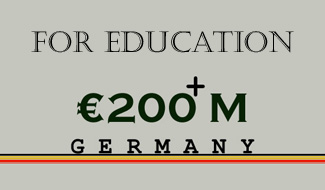
Germany Announces €200 Million in New, Additional Funding for Education Cannot Wait for Total of €318 Million; Bringing ECW’s Trust Fund to over US$1.1 Billion for Crisis-Affected Children and Adolescents
‘On International Day for Education, the German government wants to send a strong signal to act upon the global education crisis and encourage other donors to commit to sustainable financing for education in emergencies’ ~German Minister for Economic Cooperation and Development Svenja Schulze
24 January 2022, Geneva – German Minister for Economic Cooperation and Development, Svenja Schulze, today announced €200 million (US$228.3 million), in new, additional funding for Education Cannot Wait (ECW), the United Nations global fund for education in emergencies and protracted crises.
This new funding brings Germany’s total contributions to ECW to over €318.8 million (US$362.7 million). With this new multi-year announcement, Germany becomes ECW’s number one donor and Germany becomes the leading donor to commit to multi-year funding. Multi-year financial commitments are crucial to increase the predictability and effectiveness of education responses in protracted crisis settings.
The German contribution also brings ECW’s Trust Fund to US$1.1 billion; and, with over US$1 billion leveraged through ECW in-country programmes, this makes ECW a US$2 billion global fund in just a few short years since its establishment. ECW’s top three donors now are Germany, the United Kingdom and Denmark.
Education Cannot Wait Director Yasmine Sherif joins Minister Schulze in Geneva today to announce the new funding on the International Day of Education, while highlighting the urgent need to mobilize additional resources to support the millions of crisis-impacted children and adolescents worldwide who today are denied their inherent human right to an education because of armed conflicts, forced displacement, climate-induced disasters and protracted crises.
Federal Minister Svenja Schulze: “Education is the key that enables millions of girls and boys to break through the cycle of poverty and lead a dignified life. The Covid-19 pandemic is threatening to wipe out the educational successes of recent decades. Schools are closed around the world and there is a danger that many students will no longer be there when they reopen. There are also millions of displaced children who cannot go to school. The poorest people suffer the most, especially girls and children with disabilities. We have a shared responsibility not to lose this generation. That is why Germany is supporting the UN global fund for education in emergencies and protracted crises, ‘Education Cannot Wait’, with an additional EUR 200 million. ECW’s aim is to make it possible for millions more children and adolescents in crisis regions of the world to have access to quality education and a safe learning environment. Schools need to be places of safety and hope. This is true everywhere, but especially where girls and boys are impacted by emergencies, poverty and protracted crises.”
“These crucial contributions by the Government of Germany are essential in achieving our goals to provide every crisis-affected girl and boy with the hope and opportunity that a quality education provides. We call on all governments and private sector partners to follow Germany’s lead and support Education Cannot Wait’s mission with US$1 billion in urgent funding,” said The Rt. Hon. Gordon Brown, UN Special Envoy for Global Education and Chair of ECW’s High-Level Steering Group.
“We warmly thank the people of Germany and the German Government for this generous, ground-breaking contribution. Education provides safety, hope and opportunity for the millions of children and adolescents worldwide impacted by conflicts, COVID-19 and climate change,” said ECW Director Yasmine Sherif. “Together with our generous strategic donors like Germany, ECW is committed to ensuring no child is left behind as we race to deliver Sustainable Development Goal 4: inclusive, equitable, quality education, and work to build a more peaceful, more prosperous world for generations to come.”
To date, ECW’s investments have supported close to 5 million children and adolescents – half of whom are girls – with equitable, inclusive quality education. ECW’s Multi-Year Resilience Programmes (MYRPs), bridge the divide between humanitarian interventions and longer-term development aid in countries affected by protracted crises. These multi-year investments support holistic education services for the most vulnerable children and youth, including girls, marginalized communities, refugees, internally displaced children, and children with disabilities.
In all, ECW supports MYRPs in 24 countries along with fast-acting First Emergency Responses (FERs) in 35 countries worldwide. Since ECW was launched in 2016, a total of 42 emergency and protracted crisis countries have benefitted from the fund’s investments.
Schools play a crucial role in ensuring the delivery of essential lifesaving and life-sustaining services to crisis-affected children and adolescents. These range from improved access to water, sanitation, health, food, protection and psycho-social services to support children’s learning, and overall wellbeing and development.
Without access to education, girls and boys in emergencies and protracted crises settings face increased risks of dropping out and never returning to school, child marriage and early pregnancy, sexual exploitation and abuse, child labor, trafficking, and recruitment into armed groups. Girls are particularly at risk, with estimates projecting that between 11 million and 20 million girls will not return to school after COVID-19, threatening decades of progress made toward gender equality.





